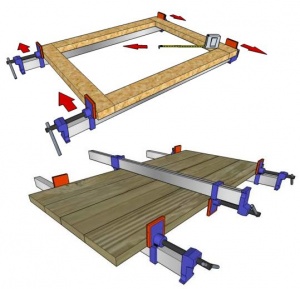Sash Cramp: Difference between revisions
From DT Online
m Improved presentation |
m Added internal link |
||
| Line 9: | Line 9: | ||
The bar can be a plain steel section, a T section or hollow. They may be drilled at regular intervals to receive pegs or have a gripping mechanism. | The bar can be a plain steel section, a T section or hollow. They may be drilled at regular intervals to receive pegs or have a gripping mechanism. | ||
Extension bars are available | Extension bars are available and '''Cramp Heads''' enable a timber batten to be used as the bar. | ||
Modern equivalents include '''Bar Clamps''' of various designs. | Modern equivalents include '''[[Bar Clamp|Bar Clamps]]''' of various designs. | ||
Revision as of 08:17, 10 December 2014

Sash Cramps are so called because their use in holding together large frames, such as window sashes, prior to gluing. They are used also when joining together wide boards.
Notes: When gluing together large frames, check for square by measuring the diagonals and slightly angle the cramps to effect any correction needed. When joining boards together, alternate cramps top and bottom as shown, to prevent the boards buckling upwards under pressure.
The bar can be a plain steel section, a T section or hollow. They may be drilled at regular intervals to receive pegs or have a gripping mechanism.
Extension bars are available and Cramp Heads enable a timber batten to be used as the bar.
Modern equivalents include Bar Clamps of various designs.